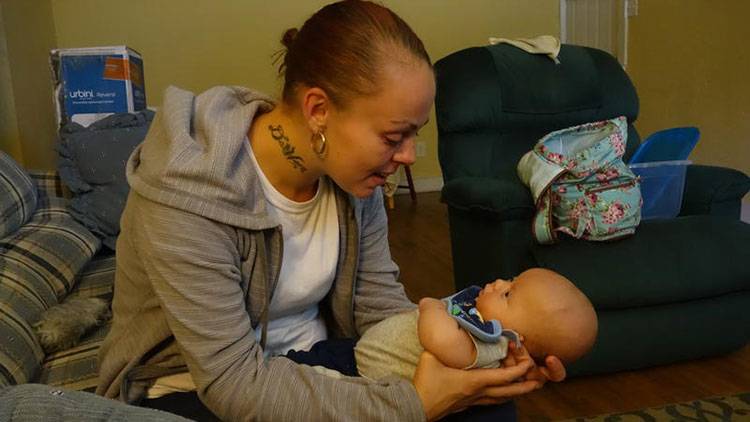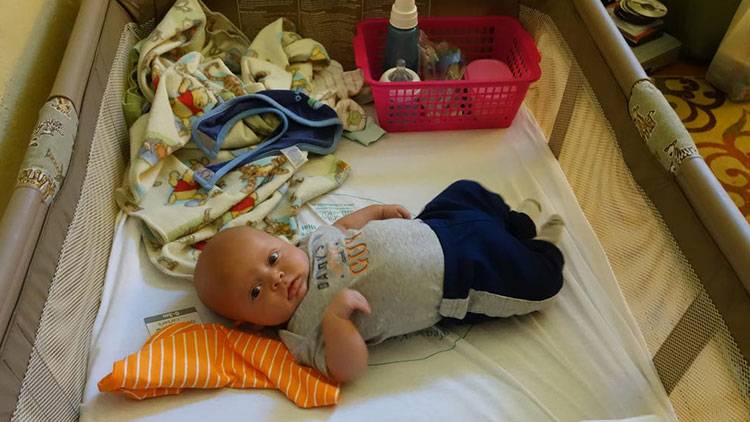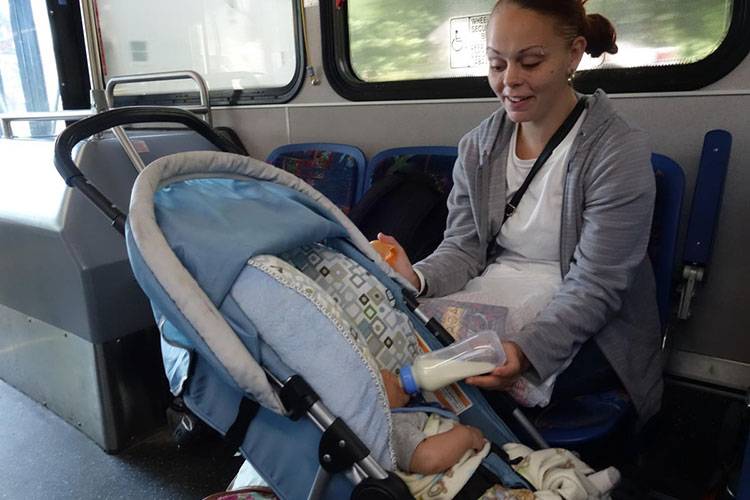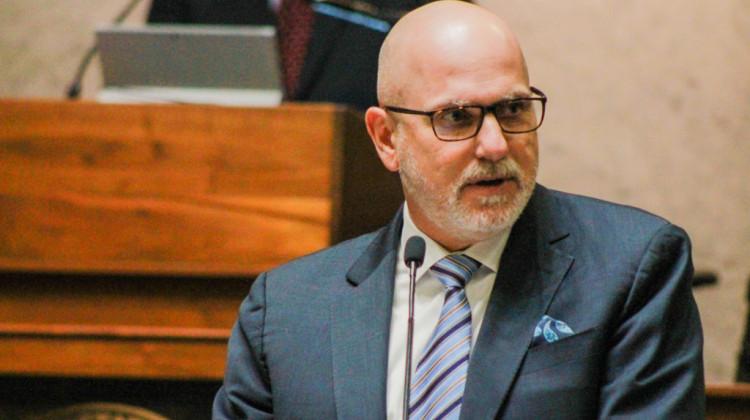
Tia Hosler with her son Marsean. Photo: Emily Forman/Side Effects Public Media
Tia Hosler woke up at 7:35 a.m. on a friend’s couch next to her newborn son’s crib after an overnight babysitting gig.
The 26-year-old had slept through her alarm and was late for the bus, her ride to group therapy in Fort Wayne, Indiana. And now she had to scramble. She tied her Kool-Aid-red hair into a tight bun and kissed her 2-month-old, Marsean.
"Bye booga,” she cooed. “I love you booga!” He was spending the day with his dad, her boyfriend. It was an important day for Hosler, her first day back to group therapy since giving birth.
“It’s always a struggle for me to get out the house,” she said on her way to the bus stop.
Every day Hosler juggles bus schedules, doctors appointments, random drug testing and job hunting. She doesn’t want to give Child Protective Services any reason to investigate her or question whether or not she’s fit to take care of her son.
For thousands of moms with opioid addiction, this is their struggle: keeping their disease under control during and after pregnancy, in order to keep their kids. If a baby is born with traces of illicit drugs in its system, Child Protective Services will likely start an investigation. That could eventually lead mothers to lose custody, if they are not receiving consistent treatment.
But finding that treatment is hard. And many mothers are wary when it comes to asking for help, for fear child protective service will take their kids.
That’s what happened to Hosler with her daughter a year ago.
When Hosler was pregnant with her 4-year-old daughter Kavaiya, she says she felt an immediate connection. “I just bonded with her, with her inside of me,” she says.
A year after Kavaiya was born, Hosler started using heroin. When it became impossible to start her day without it, she checked into a treatment program. A counselor there called CPS, and Hosler’s stepdad was given temporary guardianship of Kavaiya.
“When they took her it’s like they ripped my heart out my chest,” Hosler says. “It was really hard, especially when I wasdoing everything necessary to not lose her.”
When Holser became pregnant with Marsean, she risked losing him too.

Tia Hosler's 2-month-old son Marsean. Photo: Emily Forman/Side Effects Public Media
After a felony landed her in the Allen County drug court, the judge referred her to the Bowen Center, a mental health and addiction treatment facility. That’s when things turned around for her. While many clinics won’t treat pregnant women for addiction, the Bowen Center makes the group a priority and ensures continuous care even after birth. For example, expectant moms experiencing severe withdrawal will see the doctor right away. One of many psychiatrists will prescribe addiction medicine. The staff will work with Indiana Medicaid insurers to cover the medication, rather than allow a day to go by without it where they might relapse.
Few clinics in Indiana will do what the Bowen Center does: take Medicaid for addiction medicine, treat women in recovery while they are pregnant, offer life skills support from social workers and continue to provide care after they deliver.
It’s rare to find all these services in one place, and when they have to scramble to find the care they need, many women relapse.
Bowen Center has six locations, serving ten counties in Northeast Indiana. Melanie Stauss, a licensed clinical social at the center, says the staff works hard to build trust with women seeking care.
“A lot of times there's just a whole lot of shame and fear that that [the state] will get involved or that they're just scared that they'll lose their baby,” she says.
Strauss says many women are afraid of being judged for their addiction. At the Bowen Center, she says, the focus in on helping them, not judging them.
“I think the more supportive that we can be and the more understanding and compassionate towards them the more willing they're going to be to engage and get the help that they need,” Stauss says.
After birth, says Stauss, with a newborn on their hands, moms need a lot of extra support with basic needs: “How to manage stress, trying to find a job, how to find childcare, how to continue to avoid people, places, and things that cause them to use, try to get their basic needs met, how to put food on the table…” The Bowen Center helps with everything.
Between group therapy and appointments with her psychiatrist and therapist, new mom Hosier visits the center almost everyday—a 45-minute two-bus commute. She says it’s helpful that everything she needs to stay off drugs is in one place, including a pharmacy where she can immediately refill her prescription. And staff help her with the job hunt, driving her to drop off job applications.
She says it’s working for her. “I've stayed clean for my daughter and my son now,” she says.
In addition to her treatment at the Bowen Center, Hosler is learning to manage her disease and her life. One of many steps on her to-do list includes getting a job. During a supervised visit with Kavaiya, her CPS caseworker told her she’s good with kids. So she may consider a career in daycare or social work. But she says it’s daunting building a career now after having lost so much time to drugs.
“I can’t get those years back. I wish I could,” she says, “But I’m not old yet. I could still make something of myself.”

Tia Hosler feeds her son while riding the bus. Photo: Emily Forman/Side Effects Public Media
At lunchtime, Hosler reunites with Marsean and her boyfriend at the bus stop where she started her day. She says sometimes she rides the bus all day.
This is what we do. We got to get a car. We used to have two cars, but things happen and addiction will do that to you,” she says. “It’s a very bad disease and it rips everything away from you.”
She says her kids keep her going. “Just waking up seeing my kids faces: that’s the best feeling in the world. Especially this little guy,” she looks down at Marsean. “His smile.”
Someday soon she hopes to bring Kavaiya home. She recently started renting an apartment. Her boyfriend now works seven days a week at a plastics factory. These steps help her case.
This story was produced by Side Effects Public Media, a reporting collaborative based on public health.
 DONATE
DONATE




 View More Articles
View More Articles





 Support WFYI. We can't do it without you.
Support WFYI. We can't do it without you.